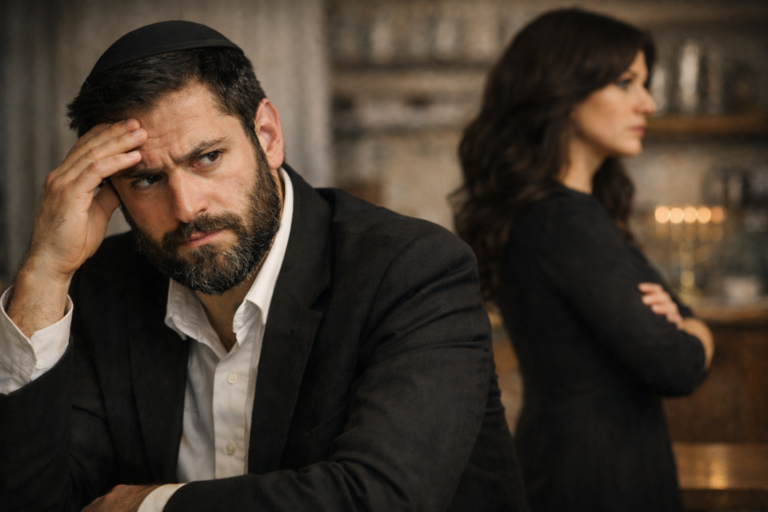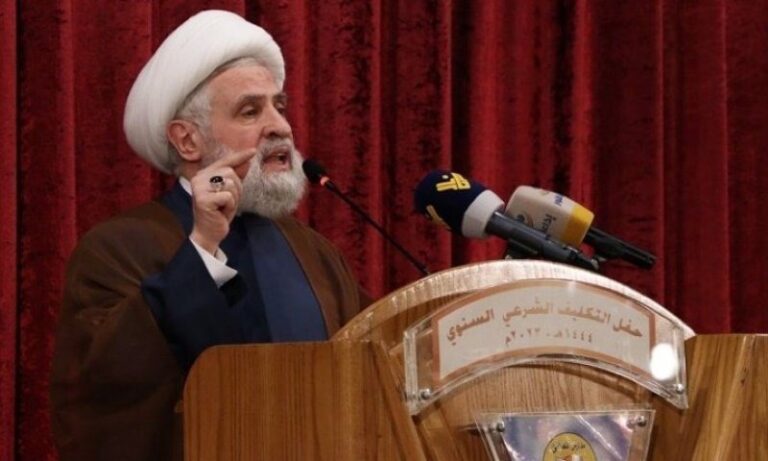 A Tel Aviv District Labor Court has canceled unemployment insurance payments to a woman who lives in Bnei Brak after the latter refused to accept a job in an office without gender separation. In the HaMevaser report, the daily chareidi newspaper speaks of the ongoing “anti-chareidi incitement” as the cause leading to the court handing down such a tainted decision.
A Tel Aviv District Labor Court has canceled unemployment insurance payments to a woman who lives in Bnei Brak after the latter refused to accept a job in an office without gender separation. In the HaMevaser report, the daily chareidi newspaper speaks of the ongoing “anti-chareidi incitement” as the cause leading to the court handing down such a tainted decision.
Justice Giltzer-Katz in her ruling stated that employment officials found a suitable job for the woman, who simply refused to accept it, stating it was contrary to her hashkafa and she simply cannot work in an office in which men and women mingle. The court ordered the state to immediately cancel her unemployment benefits as a result of her refusal to accept employment.
The court added that while the woman views the decision as discriminatory, her position is a blow to all the women fighting for equality in the workplace. The court rejected her contention that she was being discriminated again, stating that employment services officials’ simply are not required to bend over backwards to accommodate her beliefs and her conscious.
(YWN – Israel Desk, Jerusalem)











20 Responses
I assume that the Chofetz Chaim’s wife, who managed his grocery store, had male customers.
What is the problem????
The judge is 100% correct. One cannot keep chumrot at other people’s expense – certainly not at the tzibbor’s expense. To say that this is incitement is simply the Chareidi version of the trivialization of the word current among the Left.
Israel is a secular state found on the principle that Torah is something to be surpressed. The decision is quite consistent with the whole trend of the zionist movement going back to the 19th century.
Sorry akuperma. You usually comment smartly. But your point here has no connection to the issue at hand. Yes, Israel is a secular state. And I truly admire the woman for her principled stand against co-mingling in the workplace. But her choice to stand up for her very tznius beliefs doesn’t come at the cost of the taxpayer!
Yes, working with men and women together is not ideal, but if you have no job, then you need to take what is available, provided you aren’t transgressing major sins.
Sorry akuperma, there’s no halacha that says a woman must work in an office that’s not separated. This is hardly “suppressing Torah.”
#1- The Chofetz Chaim’s wife never had a male supervisor, never had to win the favor of boss upon who her family’s survival depended, and never had to work for a secular male who might consider that being a boss entitled him to certain “privileges” (which we can’t disucss on YWN, but in America are covered by laws prohibiting sexual harassment).
Would the judge rule the same if the woman had insisted that job be at a firm that observed the laws prohibiting negiah (touching) and yihud (being along)? What about an office dress code (can she refuse a job that requried her to dress immodestly as many prominent firms require, e.g. “Hooters” – and no, don’t look at their website to check). Can a frum job be denied unemployment insurance for dressing outlandishly at job interviews (wearing a frock coat instead of a modern suit, wearing a hat indoors, not to mention beard and peyos). Can you lose unemployments benefits by insisting on being Shomer Shabbos (an actual case in the US). Where can one draw the line?
The best rule we should demand is that the government should not decide on any specific level of religious observance for a government benefit. They can insist that the person look for a job that is tolerable under her understanding of her religious beliefs, but it isn’t for the government to decide which areas of halacha and which of interpretation are valid.
I’m sure the Chofetz Chaim’s wife did not mingle with the male customers of the store. And mingling is actually assur. Seperate and mingling are to very different things.
As a frum person, my religious rights are better preserved in america, than in the “jewish” homeland.
The next step is cancelling benefits for refusing to work on shabbos.
akuperma- Dont judge this ruling on your hypothesis on what the ruling would be in other cases. Based on the circumstances of this case I would side with the judge.
“government should not decide on any specific level of religious observance for a government benefit” What if her beliefs are that she needs a job that would allow her husband to sit and learn all day, can the judge decide on that? I know in this case thats not relevant but I am just stressing a point.
The judge is allowed to use common sense, and for all we know, he may have asked his LOR- not some fanatic in RBS- and have been told that halacha doesnt require what she is claiming.
“employment services officials’ simply are not required to bend over backwards to accommodate her beliefs and her conscious.”
Yes, in a Jewish state the secular government absolutely has an obligation to be tolerant of religious beliefs. Whatever happened to Israel’s mission to be a welcoming refuge for Jews?
Come now, everyone — just admit that secular Jews are often as anti-Semitic as goyim.
To ny100k, it’s not necessarily true that your religious rights are better preserved in America. For example, Beis Yaakov schools are free in Israel — the Israeli “secular Zionist” government foots the bill. In the U.S. — as you’re well aware — that would be considered “unconstitutional.”
We have to make a distinction between halacha and chumros. It’s great that the woman wants to be stringent upon herself. And in the ideal world married women shouldn’t work outside the home. And men should be supporting their family. Am I considered an apikorus if I recite what it states in the kesubah that a man is obligated to support his household. As my rosh yeshiva stated, “As long as your wife supports you in kollel, it’s a chessed. She’s under no obligation to do so.”
Think Straight wrote “you need to take what is available, provided you aren’t transgressing major sins.”
This is incorrect. You cannot transgress any sins to make money. Further you are even expected to lose all existing assets to avoid sins regardless of there severity.
Shazam – The comparrison to the Chafetz Chaims wife would be funny if it wasn’t so sad. The store belonged to her and was run in accordance with her husbands Daas Torah – the enviroment, the days and hours worked, standards of ethical conduct, ect.
The need for Chareidi men and women to work will not come at the expense of Torah Values. Especially the sanctity of the Jewish Woman, the very backbone of our nation.
Yes I know Torah is the backbone of our nation but consider this – how many boys filled the chedarim and how many men the batai midrashim in those communities where the haskala was embraced by Jewish wives and mothers?
Avi Gordon wrote – “Am I considered an apikorus if I recite what it states in the kesubah that a man is obligated to support his household.”
An apikorus no. But…
Take a look at the halacha regarding a mans obligation to hire himself out to support his wife – Shulchan Aruch Even HaEzer Siman 70 Sif 7 Rema and see the Biur HaGRA there, see the gemmara Ketuvot 63A and the machlokes in Tosfos there between R’ Eliyahu and R’ Tam – The GRA writes that most poskim held like R’ Tam. (Yes I know that other Achronim hold like R’ Eliyahu) I’m just saying that R’ Tam, the GRA, and “Rov Poskim” knew how to read the Ketuba to.
I meant – knew how to read the Ketuba too.
Never trust anyone with references…check them yourselves ! in response to “non-political” I just checked the gemoro and the tosfos in Kesubos 63A and i find nothing that even approaches what you are intimating- that a man does not have to support his wife. The “machlokes’ in tosfos refers to whether a man is obligated to hire himself out to support his wife, as per the kesubah. However, even Rabbeinu Tam agrees that he has to work the land and make a living from the land. I have not seen the shulchan aruch but I highly doubt that it says that the husband has NO duty to support his wife.
Working in a place that has both man and women is not a sin.
Any person is free to have all the chumrot/minhagei chasidut they want but when you are on umemployment and get a job offer that by dry halacha has no problem with it, just that your chumros have a problem with it you can not expect the governement to still pay your unemployment benefit.
A slightly weird example of something along the same lines (as I see it at least):
A person only eats meat from Hechsher X which is the most makpid and expensive, the person has not enough income to pay for said food, should the government/tzadaka pay for this persons ability to eat this meat every day or should this person eat less meat? And if the tzedaka fund/government says it is not willing to cover the costs of the expensive meat and only willing to pay for hechsher Y which is also kosher are they discriminating?
Or alternatively the person is only willing to eat organic (kosher) meat and is told organic is too expensive, is he being discriminated against?
In English there’s a saying “beggars can’t be choosers” if I’m not mistaken, obviously we can’t shouldn’t and hopefully don’t demand that people transgres halacha for a job, but a job that is “kosher” just not “mehadrin min hamehadrin” is still kosher.
If a religious Jewish employees’ beliefs cannot receive tolerance in Israel, then where can they?
It is shameful that the Israeli state is no more tolerant than the gentile states.
“In English there’s a saying ‘beggars can’t be choosers'” THat is true in English, but the halacha states that one is obligated to treat a beggar as he was accustomed, if he was a rich man we are obligated in hilchos tzedaka to hire someone to run in front of his carriage.
Al pi Torah “Beggars CAN be choosers”
rabbiofberlin wrote “i find nothing that even approaches what you are intimating”
I was not intimating aything – I’m glad you checked the sources, that is why i provided the mareh mekomos.
Keeper of keys says – “Working in a place that has both man and women is not a sin.”
It may or may not be – depends on many factors. It is up to the family and their Rav to make that determination.